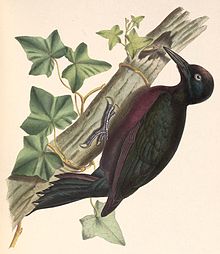Guadeloupe woodpecker
| Guadeloupe woodpecker | |
|---|---|

| |
| Scientific classification | |
| Domain: | Eukaryota |
| Kingdom: | Animalia |
| Phylum: | Chordata |
| Class: | Aves |
| Order: | Piciformes |
| Family: | Picidae |
| Genus: | Melanerpes |
| Species: | M. herminieri
|
| Binomial name | |
| Melanerpes herminieri (Lesson, 1830)
| |
The Guadeloupe woodpecker (Melanerpes herminieri) is a species of bird in the family Picidae. It is endemic to Guadeloupe.
Taxonomy
The Guadeloupe woodpecker was given its scientific name Melanerpes herminieri after the naturalist Félix Louis L'Herminier, who studied in Guadeloupe and authored numerous works on birds.[2] The name of the genus Melanerpes comes from the Greek melas meaning "black" and herpēs meaning "climber".[3] In the local Guadeloupe Creole, it is called Tapeur ("one who knocks") or Tapé.[4] It is also called Toto bwa or Toc-toc (from its tapping noise).[5]
The Guadeloupe woodpecker had been considered for some time as a monotypic genus, Linneopicus, before being definitely classified in the genus Melanerpes.[6] It is possible that it evolved from the Puerto Rican woodpecker (Melanerpes portoricensis) during the Pleistocene, itself derived phylogenetically from the red-headed woodpecker (Melanerpes erythrocephalus).[2][7] There are no known subspecies of Melanerpes herminieri.
Habitat

Its natural habitats are subtropical or tropical moist lowland forest, subtropical or tropical mangrove forest, subtropical or tropical swamps, and heavily degraded former forest. It is threatened by habitat loss.
The Birdlife Intl. page on the species says the following: "It inhabits semi-deciduous forest on igneous and clay ground, evergreen forest, mangroves and swamp forest (Villard and Rousteau 1998), and excavates nest holes in the trunks of dead trees (Raffaele et al. 1998). It occurs from sea-level to the tree-line at 1,000 m, but is most common at 100-700 m (Winkler et al. 1995, Villard and Rousteau 1998). Habitats with the highest estimated population densities were seasonal evergreen secondary growth forest, followed by swamp forest and rainforest (Villard et al. 2010). Food items taken include a variety of invertebrates, vertebrates and fruit (Villard 2000)."
References
- ^ BirdLife International (2019). "Melanerpes herminieri". IUCN Red List of Threatened Species. 2019. Retrieved 10 December 2019.
{{cite journal}}: Invalid|ref=harv(help) - ^ a b Villard, Pascal (1999). The Guadeloupe woodpecker and other islands Melanerpes. Paris: S.E.O.F. p. 20-22. ISBN 978-2-9506548-6-1. OCLC 43235429.
- ^ Jobling, James (2010). The Helm dictionary of scientific bird names : from aalge to zusii. London: Christopher Helm. p. 140. ISBN 978-1-4081-2501-4. OCLC 659731768.
- ^ [1]
- ^ >\
- ^ "Guadeloupe Woodpecker (Melanerpes herminieri)". HBW Alive. 2019-09-02. Retrieved 2019-09-02.
- ^ Cruz, Alexander (1974). "Distribution, Probable Evolution, and Fossil Record of West Indian Woodpeckers (Family Picidae)". Caribbean Journal of Science. 14 (3–4): 183–188.
External links
External links

